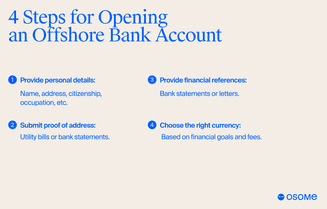The Ultimate Guide to Opening an Offshore Account
- Modified: 23 January 2026
- 12 min read
- Grow Your Business


Heather Cameron
Author
Heather is here to inform and inspire our readers. Boasting eight years in the world of digital marketing, working in diverse industries like finance and travel, she has experience writing for various audiences. As Osome’s resident copywriter, Heather crafts compelling content, including expert guides, helpful accounting tips, and insights into the latest fintech trends that will help entrepreneurs, founders and small business owners in Hong Kong take their businesses to the next level.
An offshore account is a bank account held outside of your home country. It helps individuals and companies manage international finances, handle transactions between multiple currencies, protect assets, or benefit from different tax regulations. This guide will explain what an offshore account is and its legality, types, benefits, and how to open an offshore account.
Key Takeaways
- Offshore bank accounts are legal financial tools designed for international banking, asset management, and tax efficiency so long the account holder abides by local and international compliances. Leveraging an offshore account for tax evasion is illegal.
- Popular offshore account types include personal accounts, business accounts, savings accounts, and investment accounts.
- Foreign bank accounts come with nonnegotiable regulatory obligations and security measures, as well as financial benefits such as multi-currency management and tax advantages.
What Is an Offshore Account?
An offshore bank account is a bank account held outside of your home country or your resident country. Banking offshore means you are banking outside of your home country through international banks with global financial capabilities.
These accounts allow a business or individual to manage money across multiple countries and are particularly useful for international transactions and assets abroad. For example, expatriates may use foreign accounts to manage their income and expenses while living overseas. Meanwhile, foreign companies may rely on offshore business accounts to handle transactions related to operations outside their home country and benefit from the foreign jurisdiction's tax incentives.
In addition, we offer seamless company registration services to help you establish a legal presence abroad, enabling you to optimise your international business structure efficiently.
An offshore account works similarly to a local bank account. It can make and receive payments, hold money, or be used for saving or investment purposes. Some may choose to open an offshore bank account to support overseas family members, manage assets abroad, conduct business in multiple currencies, and for estate planning purposes.
An offshore account is completely legal when used transparently and in compliance with relevant laws, dispelling the myth that an offshore account is solely for hiding money or tax evasion. Instead, opening an offshore account might help you manage taxes more efficiently.
Legality of Offshore Accounts
Despite their legitimate uses, offshore bank accounts often come with a cloud of suspicion. Common negative perceptions include their association with hiding money, money laundering, tax evasion, and other tax-related concerns. However, an offshore account can and is meant to be used legally for various purposes, such as facilitating international business and safeguarding assets.

Transparency is key when managing offshore accounts. Being honest with tax authorities and adhering to anti-money laundering regulations are essential. Checking local rules and regulations helps avoid double taxation and ensures compliance.
Offshore accounts can aid in estate planning by protecting assets from local inheritance laws. For example, offshore trust accounts and savings accounts are highly effective tools for investment portfolio diversification. In the end, the legality of your bank account depends on its compliance with local and international regulations.
Types of Offshore Accounts
Offshore bank accounts come in various forms, tailored to meet different financial needs. Common types include savings accounts, investment accounts, and business accounts. Depending on your needs, you can have multiple accounts in each country in which you hold assets or conduct business.
Personal offshore accounts are designed for individuals, providing a means to manage personal finances globally. A common investment advice you might hear from high net worth individuals is opening an offshore savings account to manage foreign assets outside of your home country.
Conversely, offshore business accounts are for entities operating outside their registered central location. Offshore business accounts help mitigate conversion losses from converting between multiple currencies and manage international transactions efficiently. The choice of an offshore account should align with one’s financial goals and circumstances, ensuring the selected account type best supports their needs.
| Type of Offshore Account | Purpose | Best For | Key Features | Examples |
| Personal Offshore Accounts | Manage personal finances globally | Individuals, high-net-worth clients | Managing foreign assets, mitigating tax exposure, earning interest | Offshore savings accounts, investment accounts |
| Business Offshore Accounts | Manage business finances internationally | Corporations, entrepreneurs | Managing international transactions, mitigating conversion losses, operating across multiple countries | Offshore business accounts, multi-currency accounts |
| Investment Offshore Accounts | Invest in foreign assets or markets | Investors, corporations | Access to global investment opportunities, foreign market diversification | Offshore investment accounts |
Benefits of Offshore Banking
Offshore banking offers numerous benefits, ranging from high privacy and asset protection to facilitating international financial commitments and simplifying cross-border payments. These accounts can be legally utilised for a variety of financial activities, making them an attractive option for those with international financial interests.
The following subsections will delve into specific advantages such as tax benefits, multi-currency management, and investment opportunities.
Tax benefits
You can open an offshore bank account to take advantage of potential tax benefits that wouldn't be otherwise available for local accounts. For example, these bank accounts may allow someone to invest while keeping capital gains from incurring income tax liability in certain jurisdictions.
In this case, opening an offshore account allows the account holder to maximise their wealth in a tax-efficient way. It can also lead to potential tax exemptions and lower rates depending on the specific regulations of the offshore jurisdiction. However, it’s crucial to declare all income and interest from offshore sources to your home country authorities to avoid legal repercussions.
Additionally, offshore banks offer services that enhance financial privacy and confidentiality, protecting clients’ identities and transactions. Offshore bank accounts also protect foreign assets and can sometimes shield them from legal claims or state seizures.
Multi-currency management
Managing multiple currencies is another significant benefit of having offshore bank accounts, as they allow holders to hold, make, and receive payments in various currencies, all using the same bank account. This multi-currency management capability can be particularly useful for those dealing with financial commitments in different countries, as it simplifies the process of international payments and transfers.
By initiating transfers using local accounts, you ensure prompt fund transfers, reduce delays and enhance your international business transaction efficiency. Offshore accounts commonly offer features like international payments, savings, and investment options, which enhance transaction capabilities and provide a seamless experience for managing finances across different regions.
Take advantage of multi-currency accounts to not only streamline payments but also reduce conversion fees. By holding funds in the currency of the country you're transacting with, you can avoid extra costs and make your international business dealings more cost-effective and seamless.
Investment opportunities
An offshore account opens up diverse investment opportunities that might not be available locally. Offshore banks provide access to a broad range of investment options, including equities in foreign currency and unique financial products. This is particularly valuable for high-net-worth individuals seeking exclusive opportunities and diversification of their investment portfolios.
Moreover, an offshore account can provide access to expertise in foreign exchange and sophisticated investment strategies, allowing clients to benefit from specialised knowledge and tailored financial advice. By leveraging these opportunities, investors can enhance their financial strategies and potentially achieve higher returns on their investments.
Supporting family members overseas
Finally, having an offshore account with a debit card and online banking function allows you to support family members overseas, such as kids studying abroad or families conducting business in another country. The account allows your family to receive payments without the loss caused by converting foreign currency. You can also set up regular international payments to provide steady financial support for your loved ones in a tax-efficient way.
Opening an Offshore Bank Account
To open an offshore bank account, you must complete several core steps to stay compliant with local and international regulations. Individuals often open offshore accounts while living or working abroad or when they have assets abroad. The convenience of maintaining bank accounts regardless of international relocations is a significant benefit.
To open a new bank account in another country, you must provide detailed personal information, adhere to varying regulations, and consider the monthly fee, service fees and minimum deposit requirements. The following subsections will detail the basic requirements, additional documentation, the purpose of the account, and choosing the right currency.

Basic requirements
Opening an offshore bank account requires basic documents and personal information, such as your name, date of birth, address, citizenship, and occupation. In Hong Kong, additional details such as passport information and Hong Kong Identity Card (HKID) number are also necessary. Proof of address, usually in the form of utility bills or bank statements, is required and must be recent (issued within the last three months). While notarisation or an apostille stamp may sometimes be needed, this depends on the specific bank’s policy.
For most banks, an in-person visit is required to complete the account opening process, though some steps can be initiated online.
Additional documentation
In addition to basic personal information, offshore banks may request a financial reference to indicate your banking history and balances. Compliance with anti-money laundering regulations necessitates providing specific additional documents. These financial references typically include bank statements, letters from previous banks, or documentation confirming your financial stability.
Accurate financial references are vital for successful application processing and regulatory compliance.
Choosing the right currency
Choosing the right currency for your offshore account depends on your specific situation and financial goals. Offshore bank accounts provide the option to hold funds in various currencies, which can be beneficial for managing international transactions. However, exchanging currencies may incur significant expenses when making deposits and withdrawals.
Selecting the optimal currency becomes clearer by studying the available options and considering your financial strategy.
Managing Your Offshore Account
Managing your offshore bank account effectively involves understanding the compliance obligations and maintaining financial stability. Offshore banking offers significant capital protection, especially during periods of financial instability. Clients often enjoy a higher level of privacy and personalised service compared to domestic banks.
However, compliance with both local and international regulations, including anti-money laundering (AML) and know-your-customer (KYC) laws, is crucial. The following sections explore handling deposits and withdrawals, utilising online and mobile banking, and implementing security measures.
Deposits and withdrawals
Funding offshore bank accounts typically involves international wire transfers, as domestic checks are often not accepted. Fees associated with offshore accounts may include monthly fees or charges for international transfers. Offshore banks provide various methods for accessing funds, such as debit cards, checks, and electronic wire transfers.
Using a debit card issued by an offshore bank is a common method for accessing funds. For larger amounts, it’s recommended to use two accounts—one offshore and one domestic for wire transfers. Checks may not be a preferred method for withdrawals due to local acceptance issues and confidentiality concerns.
Online and mobile banking
Online and mobile banking services are essential for managing offshore accounts remotely, allowing users to access funds and conduct transactions conveniently. These platforms simplify the deposit and withdrawal processes. Offshore banks provide secure online platforms for real-time account management, making it easy for clients to track transactions and manage their finances.
Mobile banking applications typically feature monitoring of account balances and transaction history, enhancing the user experience. Offshore banks also provide fund access through various digital payment options, adding flexibility to transactions. However, users should be aware of potential fees associated with the use of these digital services.
Security measures
Implementing robust security measures is crucial for safeguarding offshore bank accounts. Multi-factor authentication is a fundamental security measure that significantly protects against unauthorised access. Regularly updating passwords and using complex combinations further enhance the security of offshore funds.
Account holders must stay informed about the security measures their bank employs to protect their assets. These measures are vital for ensuring the safety of offshore funds against potential threats.
Regulatory Considerations
Understanding the regulatory framework of offshore jurisdictions is essential for compliance and asset protection. Some jurisdictions have specific laws protecting depositors’ information in offshore bank accounts. Banks must follow strict customer due diligence and monitoring protocols to comply with local anti-money laundering laws.
Additionally, some offshore banks may need to adhere to regulations from their parent institutions located in other countries. Effective offshore account management involves understanding the unique features and regulations associated with these accounts.

Reporting requirements
For Hong Kong taxpayers, offshore accounts may need to be disclosed to local authorities, particularly under the Common Reporting Standard (CRS), which promotes transparency by automatically exchanging financial account information between countries.
Hong Kong-based banks are required to report financial account information to local tax authorities, who then exchange it with relevant foreign tax authorities if applicable. Individuals should maintain thorough records of their offshore accounts and transactions to ensure compliance with both local and international reporting obligations
Local Regulations
Users of offshore accounts must ensure they comply with local laws regarding taxation and financial reporting. Regulations governing offshore accounts can vary significantly between jurisdictions, necessitating careful local compliance. Companies often need to submit additional documentation to open an offshore account to comply with local government and bank requirements.
Grasping local regulations and compliance requirements is crucial for managing offshore accounts to avoid legal and financial complications.
Offshore Banking Services
Offshore banking services include multi-currency accounts and competitive foreign exchange rates, which are beneficial for international transactions. These services are provided by local banks, specifically catering to clients with offshore accounts, ensuring that their unique financial needs are met.
The following sections detail the financial services, international transfers, and expert advice available through offshore banking.
Financial services
Offshore banks provide international expertise and investment advice, helping clients make informed financial decisions. Companies with international operations rely on essential financial services. These services include foreign currency hedging, investments, and borrowing in foreign currencies. Fintech companies also offer business accounts and payment solutions accessible remotely, providing flexibility similar to an offshore account.
Innovative fintech solutions streamline transactions and reduce operational costs compared to traditional offshore banking. For instance, the HSBC Expat bank account supports multiple currencies and provides essential tools for building, running, and scaling a business across multiple countries. HSBC accounts also enjoy the financial security provided by one of Hong Kong's most credible financial institutions, allowing foreigners to create a secure and central location to manage all their international transactions.
If you need help with opening a bank account and registering a company in Hong Kong, please don’t hesitate to get in touch with us. We can connect you with our local network of neobanks and traditional banks and expedite your application for the most appropriate account
International transfers
Offshore accounts enable quick international transfers, often credited on the same day. This ability to facilitate fast and efficient international transactions is critical for global businesses and individuals who make regular international payments from a secure and central location.
The HSBC Expat bank account displays all charges and foreign exchange rates upfront, eliminating hidden fees. You may even waive the monthly fee if your HSBC Expat account meets certain criteria. HSBC accounts also come with a dedicated relationship manager to help you resolve any issues you might have regarding your transactions.
Expert advice
Offshore banking provides clients with tailored financial advice, catering to their individual and business needs. These services leverage international expertise to offer comprehensive financial strategies.
By using expert advice, clients can enhance their financial acumen and make decisions that align with their personal circumstances and financial goals.
Alternatives to Offshore Banking
Those seeking alternatives to traditional offshore banking can consider virtual banks and fintech solutions, which offer convenience and innovation. These alternatives simplify banking processes and reduce the complexities associated with traditional offshore accounts.
The following sections explore virtual banks and fintech solutions as viable alternatives to offshore banking.
Virtual banks
Virtual banks operate without physical branches, offering internet-based services for a convenient banking experience. They often charge a lower monthly fee and offer higher deposit rates compared to traditional banks, making them attractive for managing finances. Though virtual, these accounts usually come with debit card capabilities for physical transactions and withdrawals.
These features make virtual banks a practical alternative for those looking to avoid the complexities of traditional offshore banking. Some companies may choose to open a business account with a virtual bank instead of a traditional bank.
Fintech solutions
Fintech solutions are becoming increasingly popular as alternatives to traditional offshore banking due to their innovative functionalities and convenience. Regulatory frameworks often allow for testing these solutions under controlled conditions, ensuring they meet necessary standards while providing enhanced banking services.
Fintech solutions streamline banking processes, making them a viable option for those seeking modern, efficient ways to manage their finances globally.
| Feature | Offshore Banking | Virtual Banks | Fintech Solutions |
| Banking Model | Traditional | Online-only | App-based |
| Fees | ✘ Higher fees | ✔ Lower fees | ✔ Often low or subscription-based |
| Currency Management | ✔ Multi-currency accounts | ✔ Global transfers | ✔ Flexible, global management |
| Global Access | ✔ International access | ✔ Accessible anywhere | ✔ Fast global access |
| Regulatory Oversight | ✔ Well-regulated | ✔ Local digital regulations | ✘ Varies by region |
| Transaction Capabilities | ✔ Comprehensive payments | ✘ Limited to online | ✔ Fast, secure solutions |
| Physical Presence | ✔ Offices in tax-efficient regions | ✘ No physical branches | ✘ No physical branches |
| Best For | ✔ International business | ✔ Low-cost online banking | ✔ Tech-savvy, modern banking |
Summary
In summary, offshore banking offers numerous benefits, including tax advantages, multi-currency management, and diverse investment options. However, it requires careful compliance with legal and regulatory frameworks to avoid potential pitfalls. Whether you choose traditional offshore accounts, virtual banks, or fintech solutions, understanding the intricacies of each option is crucial. By leveraging the information provided in this guide, you can make informed decisions that align with your financial goals and ensure the secure and efficient management of your wealth.






